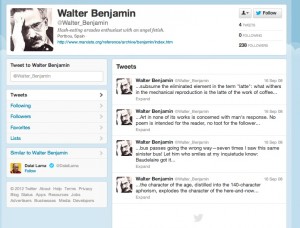This is the second part of a textual reconstruction of a talk I gave on Benjamin at SUNY Albany.
After setting things up in the first part of my presentation on Benjamin and Twitter, and demonstrating how the cyberflâneur was alive and well on “the street” of Twitter, I went looking for Walter Benjamin there as well.
As it turns out, several people have set up accounts such as this, which intermittently posts Benjamin quotes, but someone also went to the trouble of setting up this short-lived parody account:

Aside from the comedic value of this account’s first tweet—”…the character of the age, distilled into the 140-character aphorism, explodes the character of the here-and-now…—I was struck by Twitter’s characterization, as you will note in the lower left-hand corner, of the Dalai Lama as “similar” to Benjamin.
Read the rest of this entry »
This is the first part of a textual reconstruction of the talk I gave on Benjamin at SUNY Albany.
1.The Death of the Cyberflâneur
In February 2012 Evgeny Morozov’s published an opinion piece in the New York Times entitled, “The Death of the Cyberflâneur.” Evgeny Morozov is a researcher and critic who wrote a book, The Net Delusion, in which he calls into question the cyber-utopian tendency to see an inherently liberating power in the web and social media.
With an eye sensitive to decline (Verfall) and the darker side of things, Morozov lamented in the Times the lost days when one would go on the web to “surf” and explore a sometimes surprising, even shocking world. Those were the days, in his view, of the cyberflâneur, the digital doppelgänger of the Parisian flâneur.
Today, he claimed, the web had found its Haussmann in the figure of Mark Zuckerberg. Facebook, according to Morozov, had brought an end to cyberflänerie. Facebook is essentially an infinitely extensible couch where we sit with our friends, exchanging photographs and found objects, texting, and commenting on the shows we’re watching. Facebook is the bourgeois interior realized in cyberspace and, hence, the grave of the cyberflâneur. After all, you can’t be a flâneur if you never leave the house. Read the rest of this entry »
Below is the text of a proposal I submitted to a conference entitled “Critical Speculations: Future Worlds, Perilous Histories, and Walter Benjamin Unbound” which will be held at SUNY Albany September 28-29, 2012
At the very end of his much-cited—and frequently misunderstood—essay on the work of art in the age of mechanical reproduction, Walter Benajmin wrote, “Humanity, which once upon a time in Homer served as an object of fascination for the gods, has now become one for itself.”
As with much of that essay, this sentence is more true now than when it was written. While one need look no further than the ubiquity of reality television to appreciate this, it is actually in social media, and especially on Twitter, that this process achieves its mass apotheosis. Indeed, Twitter is the contemporary, virtual manifestation of the Parisian Arcades that Benjamin spent the last years of his life studying.
For Benjamin, the Arcades served as an allegorical crystallization of the far-reaching and irreversible changes wrought by the accelerated rise of modernity. The same must be said of Twitter with regard to the post-modern, post-industrial, hyper-mediated present. Indeed, like a living, electronic reef, Twitter is composed of the accreted micro-sentiments of mankind. As such, it provides a protean, hyperdimensional portrait of contemporary subjectivity in all its most trivial, absurd and sublime glory.
Read the rest of this entry »
